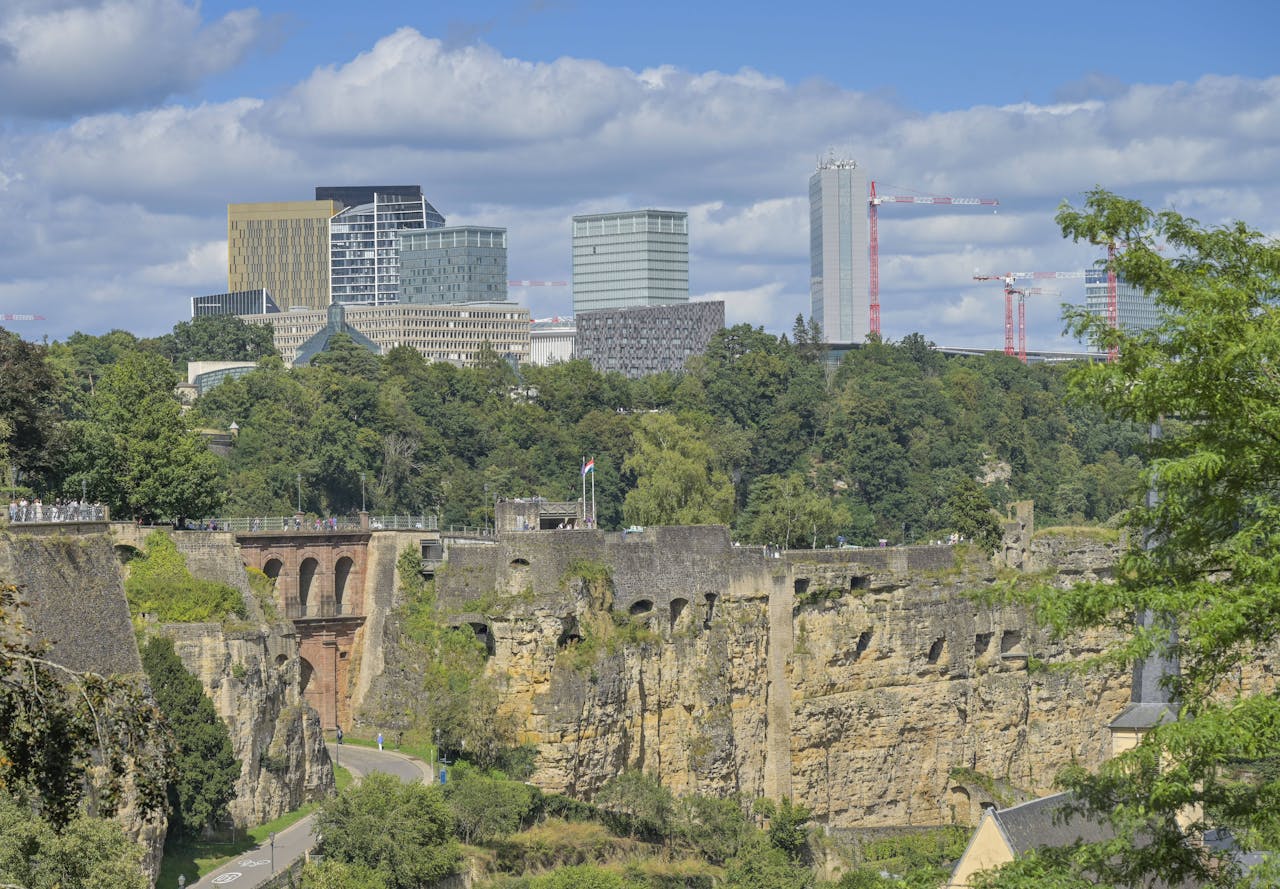The 'Brussels effect' also plays out in space


The European Commission last week presented common rules to keep the space above our heads open and safe. Part of this includes satellite traffic rules, intended to prevent the dreaded Kessler syndrome, or Kesler effect. In short, space debris collides with a satellite, creates more space debris that in turn hits other satellites — the end result being a kind of pea soup of debris that makes space unusable.
But how effective is Brussels' attempt to avert that danger? Satellites launched elsewhere in the world also zoom through the airspace, and in many cases there is hardly any legislation or regulation. Isn't the very first European space law then mainly fighting a losing battle?
Sarah Moens does not believe in that. 'It is crucial that the regulation will also apply to non-EU operators that are active in Europe', the Belgian board member of the European Centre for Space Law tells the FD. 'The EU Space Act functions as a legal blueprint that forces other countries to follow suit.'
That would be a new example of the famous 'Brussels effect': European regulations that, thanks to the economic weight of the internal market, become the global standard. 'Certainly commercial space companies have an interest in applying the same standards everywhere', says Moens. 'I also expect that other regulatory regimes will adapt their standards for the sake of compatibility. That makes this initiative much more than symbolic.'
2. Poland satisfied with European migration rules…The Polish EU presidency ends on Monday; Denmark will take over for the next six months. Last week, during a visit to Brussels, State Secretary for Migration and Security Maciej Duszczyk looked back on what Poland has achieved in its field. More control over migration was one of the priorities of the presidency, and Duszczyk is therefore delighted that the European Commission introduced stricter return legislation in March.
According to Duszczyk, Poland is playing by European rules. In December, the country was given permission by the Commission to temporarily suspend asylum procedures at its eastern border, where it is facing so-called 'hybrid warfare' from Russia and Belarus: the artificial supply of migrants from conflict zones with the aim of destabilising European countries.
The temporary legislation is being extended again and again and that remains necessary, says Duszczyk. On his phone he shows videos of migrants trying to cross the border at night. In one of the images stones are thrown at Polish border guards. 'Unfortunately, at the end you see that shots have to be fired.'
The State Secretary does not want to hear of a comparison with Hungary, which has been using fences and strict border measures since 2015. Prime Minister Viktor Orbán recently stated that other Member States now finally see why this is necessary. But according to Duszczyk, the situation is fundamentally different. 'We have waited for a legal basis from the Commission and are closely following the Brussels recommendations. Our approach is temporary, territorial and proportionate. We continue to allow vulnerable groups in — unaccompanied minors, for example, continue to receive protection.'
Duszczyk also sees another important difference: 'Hungary can at least still negotiate with Serbia, but for us that is impossible with Belarus.'
…but is Warsaw really that good at following those rules?The question remains how far Poland wants to go in the new European migration pact, which will come into full force from the summer of 2026. The Tusk government has already said several times that it will not adhere to all parts. 'We will not introduce anything that will endanger our security,' Duszczyk states resolutely.
As an example, he mentions the crisis regulation from the pact, which applies in the event of exceptional migration pressure. 'That does not solve anything, it only extends the period in which we have to grant asylum. Belarus would immediately exploit that. Our current approach works better and is stricter. Why would we opt for less security? I think that more and more member states are realizing that too.'
Is there a threat of infringement proceedings from the Commission? 'That is possible, we will see. Let's wait until June next year. Hungary has already said that it does not want to implement any part of the migration pact. We have good arguments why we cannot implement certain parts — and we hope to convince the Commission with them.'

First of all, let's state that there are more exciting capitals in the EU than in Luxembourg, then we've already noted that. And yes, Brussels press mosquitoes like to leave the Grand Duchy quickly for that reason after the hard work and the cheap fuel after the umpteenth EU must.
But … As a city, Luxembourg scores quite well, according to Deutsche Bank Research’s annual global comparative study of financial centres. In fact, Luxembourg comes in first place when it comes to quality of life. And Europe can be pleased: of the top ten, nine are European cities, the first non-European city is Melbourne, in ninth place.
According to the study, Luxembourg scores well if you add together factors such as safety, travel time (well, better not try to get to Kirchberg by car during rush hour, but it's true, the tram is free), health care, low environmental pollution and housing costs (there is still some room for improvement, so the story goes).
Also in the top five: Copenhagen, Amsterdam and Vienna (joint third), Helsinki and Geneva. Joint last: London and New York – embarrassingly lower than Frankfurt (7) and slightly lower than Paris (44).
Would you like to receive this Europe newsletter by email every week? Then sign up here. And here are previous issues .
• Brussels think tank Ceps will hold a discussion on Monday about citizen participation in the European Union, and whether the way in which the European Commission organises it strengthens or weakens democracy. With, among others, researcher Alvaro Oleart and the Green MEP Daniel Freund.
• On Tuesday , Denmark will take over the EU presidency from Poland until the end of the year.
• The European Central Bank is holding its annual forum in Sintra on Tuesday . Watch here .
• European Commissioner for Tech Sovereignty Henna Virkkunnen will explain on Tuesday the next steps Brussels wants to take to develop AI gigafactories in the EU. The Dutch government is committed to such an AI factory in the north. The cabinet and the region are putting €130 million on the table for this .
• There will be a debate in Holland House Brussels on Tuesday on whether Ursula von der Leyen will keep her promises. And more .
• On Wednesday, the European Commission will present a climate law that should provide clarity on the EU's climate target for 2040. There will also be a quantum strategy, a life sciences strategy, an action plan for the chemical industry and a master plan for a European high-speed train network.
• The first EU-Moldova summit will take place in the Moldovan capital Chisinau on Friday , where the EU will reaffirm its 'strong political and financial support for Moldova's EU accession path'.
Want to read (and listen or watch) more?Ukraine and/in the EU For his documentary The EUkrainian , Swedish filmmaker Viktor Nordenskiöld followed Ukrainian Deputy Prime Minister Olha Stefanishyna for years. Since the large-scale invasion by Russia, she has been trying to speed up her country's accession process to the EU. In theaters now, here's the trailer .
Techbrüder The European Commission is going to give American tech companies a say in the application of the Digital Services Act and the Digital Market Act. Don't do that, say German tech companies. They wrote an urgent letter to Chancellor Merz . Oh: Canada is abandoning a tax for US tech companies.
Get out Mallorca, Florence, Barcelona and Prague have something in common: residents no longer accept mass tourism. On Saturday, the Czech capital saw a protest against tourism , with playful football matches of Prague vs Airbnb .
Get Out II Serbian police arrested 70 people on Saturday during large demonstrations against the Vucic government.
Fire season France is in the grip of a heatwave , like many EU member states. And then there are people who barbecue in the countryside but don't put out the fire properly .
Europamania is written by FD-Brussels residents Daan Ballegeer and Mathijs Schiffers , plus Han Dirk Hekking . Do you have any comments or news? Let us know via [email protected] .
fd.nl






%2Fs3%2Fstatic.nrc.nl%2Fwp-content%2Fuploads%2F2025%2F06%2F30054940%2FG7-SUMMIT-TRUMP-CARNEY_68519532.jpg&w=3840&q=100)